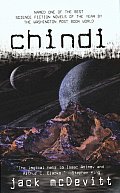
| Series: | Academy #3 |
| Publisher: | Ace |
| Copyright: | July 2002 |
| Printing: | November 2003 |
| ISBN: | 0-441-01102-0 |
| Format: | Mass market |
| Pages: | 511 |
This is the third book in the Academy series, a loosely connected set of books featuring the pilot Priscilla Hutchins. It's readable without the previous two novels, although there are several references to previous events that would have to be read as unexplained character background. (It's also considerably better than the previous two novels in the series, which makes skipping them worth considering.) Like Deepsix, it isn't directly concerned with the discoveries of The Engines of God.
As with the previous two books, the basic setup is interstellar archeology and exploration. The hook this time is the discovery of an artificial signal coming from orbit around a neutron star, accidentally intercepted by a scientific research mission. When the signal is confirmed by a later satellite, a well-financed enthusiast group hunting intelligent life in space funds an Academy mission to investigate, and Hutchins takes the job as pilot.
This is the second time that McDevitt has written two okay books in a series and then kicked it into high gear with the third book. I wasn't sure it was going to happen this time, since neither The Engines of God nor Deepsix were particularly inspiring. But Chindi is significantly better and reason to continue with the series even if you'd given up on it. It starts as a possible first contact story, turns into that cross between scientific experimentation and exploration that McDevitt writes so well, and concludes with a well-handled Big Dumb Object story, all with characters who are much more interesting and sympathetic than the cast of Deepsix.
When the topic of SF novels about practicing scientists comes up, people seem to turn primarily to Benford's Timescape as the canonical example. There's something to that, but I think it gives the idea a bad name through boredom. I would point people to McDevitt instead, and Chindi is an excellent example. Even though much of the cast here are talented amateurs, the story has the right feel. McDevitt shows institutional politics, clashes of egos, guesses, hypotheses, attempts to gather evidence, dead ends and false starts, and a fascinatingly stochastic sense of pace and tension. And he does this with interesting characters and enough tension and drama to satisfy the reader's desire for entertainment, unlike Timescape. Chindi isn't going to win points for being absolutely realistic science, but the storytelling technique is both effective and unusual.
One of the tricks that McDevitt uses to great effect is to break the reader's expectations around pacing. Most novels have a predictable tension structure, where suspense builds up to discovery that's always significant. McDevitt's books sometimes feel slow-paced to start with, partly since he doesn't always follow this structure. Instead, his suspense sometimes leads to nothing, and the timings of discoveries can be erratic and unpredictable. This echoes the way real science and real exploration work, but requires the book to provide enough space in which to embed moments of discovery. That space is taken up, as it would be in life, by interpersonal issues, deeper characterization, and (often petty) politics. When the technique doesn't work, McDevitt's books can feel a bit padded, but when it does work (as with Chindi), the pace is part of the atmosphere and effectiveness of the story.
This would be for naught without a worthwhile payoff, of course, and that's where McDevitt sometimes falls short. Deepsix was too much of a survival story that just happened to be set on an alien planet. Chindi is much stronger: the stakes are high, the chase is complex and peppered with moments of high tension, and the conclusion feels satisfyingly large without turning the cast into Indiana Jones. McDevitt is not a particularly lyrical writer, but he succeeds in capturing a sense of awe, wonder, and confusion that's vital to a good Big Dumb Object story, and avoids the trap of turning it into an emotionless engineering puzzle.
Chindi isn't a dramatic story about world-changing events. It's a story about incremental discovery and sudden danger. Similarly, the characters don't undergo major transformations, but they do learn and change the way real people going through a significant event change: in small ways, through personal connections, and in ways aligned with their previous training and tendencies. It's not a book that's likely to blow you away, but I found myself engrossed and reading it for longer periods than I had intended. It's an excellent example of the Big Dumb Object genre. I would go so far to say that it's the sort of book that Rendezvous with Rama could have been and wasn't (and re-read Rendezvous with Rama afterwards to confirm that opinion).
If you liked McDevitt's Alex Benedict books but found the earlier Academy books disappointing, give Chindi a try and skip the earlier books in the series if necessary. I also recommend it if you're looking for a good space exploration story and don't mind a few bits of magical technology that make the world easier to tell stories in. I was considering giving up on this series, but Chindi impressed me enough that I'm going to keep reading.
Followed by Omega.
Reviewed: 2011-04-26